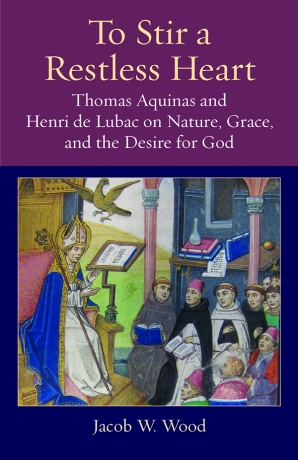- Home
- Thomistic Ressourcement Series
- religion
- To Stir a Restless Heart
Preparing your PDF for download...
There was a problem with your download, please contact the server administrator.
To Stir a Restless Heart
Thomas Aquinas and Henri de Lubac on Nature, Grace, and the Desire for God
Thomistic Ressourcement Series
Imprint: Catholic University of America Press
To Stir a Restless Heart tells for the first time the story of how Thomas Aquinas conversed with his contemporaries about the dynamics of human nature's longing for God, and documents how he deliberately utilized Greek, Arabic, Hebrew, and Latin sources to develop a version of Aristotelian natural desire that was uniquely Augustinian: natural desire seeks the complete fulfillment of human nature "insofar as is possible," and so comes to rest in the highest end that God offers to it. Depending on whether God offers the free gift of grace to humanity, one and the same natural desire can come to rest in knowing God through creatures or seeing God directly.
Tracing the reception of Aquinas in the centuries that follow, Jacob Wood argues that Aquinas's student from among the Augustinian Hermits, Giles of Rome, consciously transformed Aquinas's understanding of human nature. By insisting that every nature has a positive aptitude for one, specific end, Giles tied our natural desire positively and directly to the vision of God, setting up a 700-year challenge among the Augustinian Hermits to explain the integrity of a nature with a supernatural end, as well as the gratuity of the grace which perfects it. Showing how de Lubac's early discovery of that tradition served as a principal source for his "natural desire for a supernatural end," To Stir a Restless Heart argues that many recent criticisms of de Lubac's theological anthropology find ready answers among the Augustinian Hermits, but that a renewed understanding of Aquinas's Augustinianism offers a more complete way forward: it preserves Aristotle's commitment to the integrity of human nature, de Lubac's commitment to the transcendence of human perfection, and Augustine's insistence on the priority and gratuity of divine grace in the work of redemption.
Jacob W. Wood is assistant professor of theology at Franciscan University of Steubenville.
"A fine example of the level reached in the study of medieval figures by contemporary American PhD-level scholars, who now populate philosophy and theology faculties. Readers should be confident with Jacob Wood as their guide in this deeply informative book."
~Mark F. Johnson, Marquete University
"The natural desire to see God is one of those nodal questions that invite and perplex the mind throughout the ages, attracting the attention of thinkers such as St. Thomas Aquinas and Henri de Lubac.... Jacob Wood’s To Stir a Restless Heart succeeds in shedding much new light on this old debate by a deep study of the sources, context, and development of St. Thomas’s writings on this topic, on the one hand, and the Augustinian and Aegidian sources for de Lubac’s position, on the other."
~Lawrence Feingold, author of The Natural Desire to See God According to St. Thomas and His Interpreters
"Carefully analyzes the assembly of St. Thomas’s mature position on the natural desire to see God, with fine-grained attention to his sources and interlocutors. Wood gives us a new point of departure for subsequent assessment of the relation of Cajetan, Suarez, and de Lubac to St. Thomas—and for the assessment of our relation to God."
~Guy Mansini, OSB, author of Fundamental Theology (CUA Press)
"Offers an arduous retrieval and analysis of the debates, publications, and ecclesial culture surrounding the concept of a natural desire for God. Wood demonstrates that there is now almost universal agreement that there is such a desire, and he locates Henri de Lubac’s account within the "Aegidian" (from Giles of Rome) tradition. For those who find it difficult to see the wood for the trees in this forest of argument and counterargument, Jacob Wood’s work is mercifully clear and unpolemical. The research is dense, but the analysis is clear and the expression highly lucid."
~Tracey Rowland, University of Notre Dame (Australia)
"A tour de force of historical scholarship on Thomas Aquinas and the Thomistic tradition. Anyone possessed of an innate appetite and natural desire for Aquinas’s thought and medieval theology will reap large profits from perusing this magnum opus."
~Catholic Review of Books
"Wood’s mastery of the Thomistic source material, as well as his thorough-going familiarity of the commentarial tradition, makes his thesis a compelling one and one which perhaps pours some cooling water on a theological firestorm that looks as though it could flare up again in this century. This book will likely be at the center of scholarly debate around the natural desire for the supernatural for some time to come."
~Reviews in Religion and Theology
"Wood explicitly undertakes what Thomas himself did almost 800 years ago: an ‘update’ to questions that were as valid then for the believing Christian as they are now. The update emerges as a successful and convincing ‘follow-up’ to Aquinas’s solution in its method, objectivity, and aims."
~Theologische Revue
"It does not seem exaggerated to say that Wood's work is destined to become a genuine milestone in the interpretation of Aquinas's thought on the relationship between nature and grace."
~Annales Theologici
"It does not seem exaggerated to say that Wood's work is destined to become an true milestone in the interpretation of Aquinas's thought on the relationship between nature and grace."
"Unequivocally the most significant contribution to the nature-grace debate."
~Nova et Vetera

